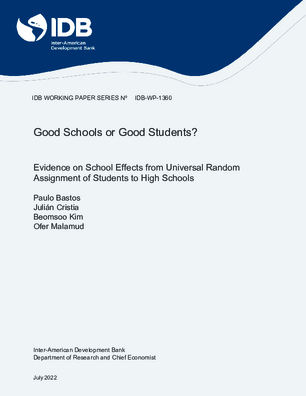Good Schools or Good Students?: Evidence on School Effects from Universal Random Assignment of Students to High Schools
Date
Jul 2022
How much do schools differ in their effectiveness? Recent studies that seek to answer this question account for student sorting using random assignment generated by central allocation mechanisms or oversubscribed schools. However, the resulting estimates, while causal, may also reflect peer effects due to differences in peer quality of non-randomized students. We exploit universal random assignment of students to high schools in certain areas of South Korea to provide estimates of school effects that may better reflect the effects of school practices. We find significant effects of schools on scores in high-stakes college entrance exams: a 1 standard deviation increase in school quality leads to 0.06-0.08 standard deviations higher average academic achievement in Korean and English languages. Analogous estimates from areas of South Korea that do not use random assignment, and therefore include the effects of student sorting and peer effects, are substantially higher.




